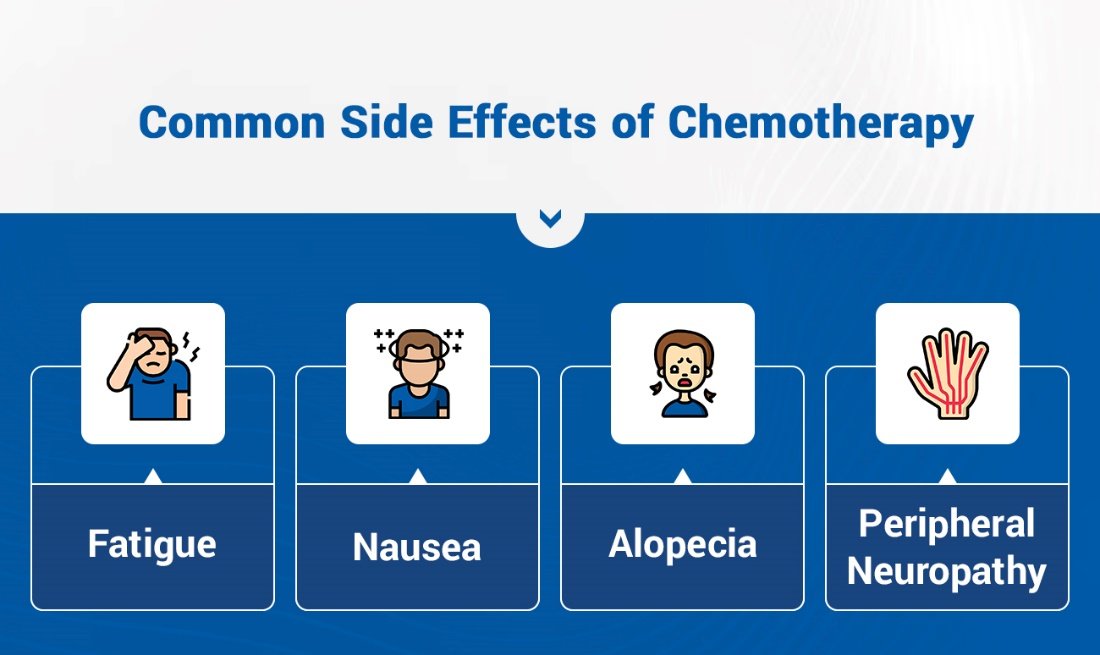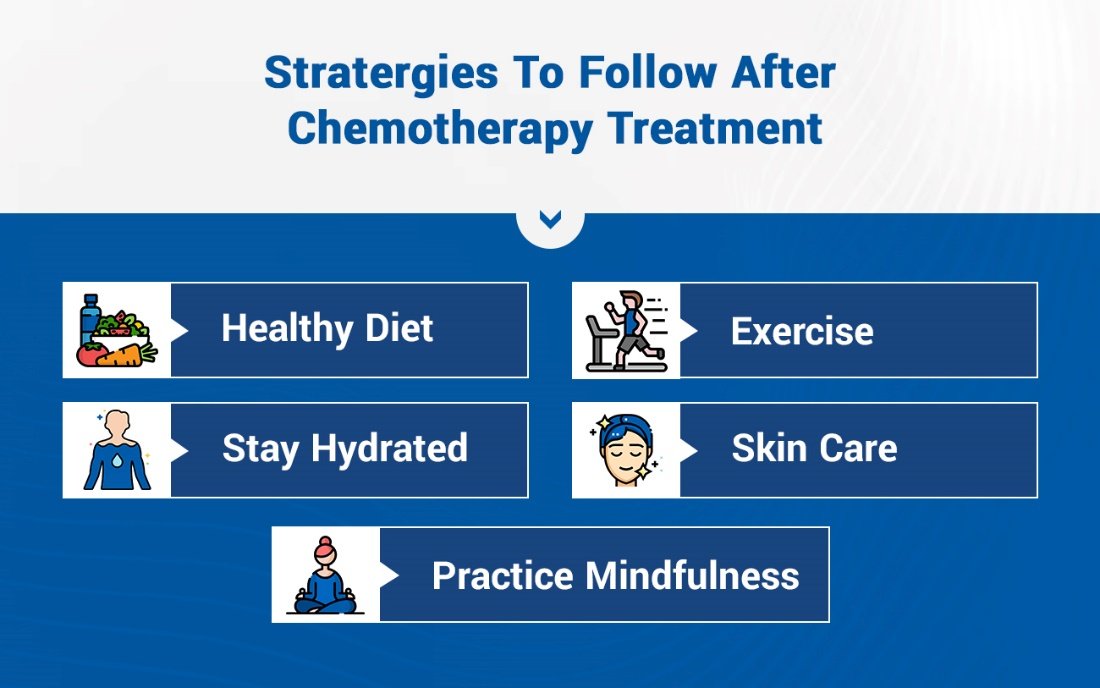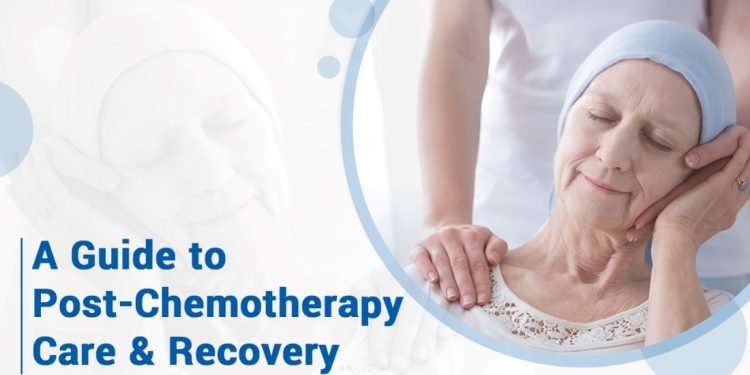Chemotherapy is a form of treatment that involves administering drugs to treat cancer by destroying cells in the body. These drugs are usually given intravenously (through a vein) or orally (in pill form). These drugs, however, target both cancerous and healthy cells. Hence, while chemotherapy can be effective in fighting cancer, it also comes with a host of side effects that can take a toll on the body.
The Common Side Effects of Chemotherapy

Chemotherapy works by targeting active cells. The drugs used in chemotherapy not only kill cancer cells but also affect normal cells. This includes the cells in the hair follicles, the lining of the mouth, the stomach, and blood forming cells. This can lead to side effects such as:
- Fatigue – It is a common side effect of chemotherapy and can be caused by drugs themselves or by anemia as a result of the treatment. Fatigue can last for several weeks after treatment.
- Nausea and vomiting – Chemotherapy drugs can cause stomach discomfort and lead to nausea. To mitigate these side effects, medical professionals often prescribe anti-nausea medication.
- Hair loss (alopecia) – It is a well-known side effect of chemotherapy as the drugs affect rapidly dividing cells, including those in hair follicles. Hair loss is usually temporary, and hair will regrow after treatment is finished.
- Peripheral Neuropathy – Chemotherapy affects the nerves and causes numbness, tingling, and pain in the fingers and toes. This can be caused by certain chemotherapy drugs and can occur during or after treatment.
Other side effects of chemotherapy include anemia, decreased immunity, decreased appetite, and risk of infection.
It’s important to note that not all patients will experience all side effects, and the intensity of side effects can vary from person to person. If the severity of the side effects is extreme, consult with ACTC experts for proper management of side effects and relief from symptoms.
Management After Chemotherapy Treatment

Cancer can be harsh and drugs plus treatments used can also weaken the body, making it susceptible to side-effects even while on the path to recovery. Which makes it essential for proper care in order to nurture the body back to good health.
The following simple steps can improve quality of life after chemotherapy treatment.
- Healthy Diet
Chemotherapy can cause changes in taste and smell, making food less appealing. This can lead to decreased appetite and weight loss, affecting overall health and recovery. It also weakens the immune system, making the patient more susceptible to infection. Consuming a well-balanced diet that includes a range of fruits, vegetables, lean proteins, and healthy fats can help strengthen the immune system and combat common side effects associated with chemotherapy, such as nausea and vomiting. A nutritious diet can support the body during and after chemotherapy treatment.
- Stay Hydrated
Staying hydrated during and after chemotherapy treatment is essential as it can cause dehydration, making it difficult for the body to retain fluids. In addition, it can cause side effects such as fatigue, nausea, and constipation. Therefore, it is essential to drink plenty of fluids such as water, electrolyte-based drinks, fresh fruit juice and broth throughout the day.
- Exercise
Physical activity such as walking, swimming, yoga, tai chi, pilates and dance can improve cardiovascular fitness, help with muscle building, improve joint flexibility and endurance, reduce the risk of developing chronic diseases and improve overall health.
Additionally, ACTC providers can guide on a possible fitness routine considering an individual’s medical condition and help them achieve a healthy lifestyle.
Here are some tips for getting started with physical activity after chemotherapy:
- Start with gentle exercises such as walking, yoga or swimming
- Gradually increase the intensity and duration of the training once comfortable
- Listen to your body and take rest days when tired
- Incorporate variety into an exercise routine to prevent boredom
- Identify an activity that is enjoyed and make it a regular part of the routine
Remember that physical activity is essential for recovery after chemotherapy. Everyone’s recovery process is different, so it’s necessary to be patient and to take things at your own pace.
- Practice Mindfulness
Managing stress and fatigue during and after chemotherapy treatment is vital. Relaxation techniques such as deep breathing, meditation, and yoga can help reduce stress and promote relaxation. These mindfulness practices can help focus on the present moment and being aware of one’s thoughts, feelings, and sensations. Joining a support group will give practical advice, emotional support, and a sense of community.
- Skin Care
Chemotherapy can cause several side effects, including skin issues such as dry and itchy skin, rashes, and increased sensitivity to the sun. To help alleviate skin issues, it’s essential to keep the skin moisturized and protected from the sun. In addition, using mild, fragrance-free products can help minimize irritation. Gentle cleansing and avoiding hot showers or baths can also be beneficial.
Conclusion
Managing the side effects of chemotherapy can be an ongoing process. Therefore, it is essential to work closely with one’s healthcare team to create a plan for post-chemotherapy care. This may include follow-up appointments, monitoring for changes in health, and addressing any concerns or symptoms.
Physical therapy and rehabilitation can also help manage the side effects of chemotherapy and assist individuals in regaining strength and function. The goal is to maintain overall health and well-being so that the patient can live everyday life with ease.












